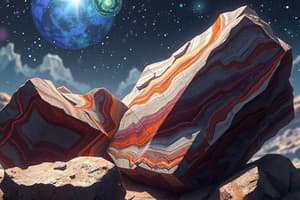Podcast
Questions and Answers
Which mineral is known to be always strongly magnetic?
Which mineral is known to be always strongly magnetic?
- Pyrite
- Hematite
- Magnetite (correct)
- Galena
What process is used to test a mineral for magnetism?
What process is used to test a mineral for magnetism?
- Using a hand magnet (correct)
- Dissolving in water
- Reacting with acid
- Measuring specific gravity
What are striations in minerals?
What are striations in minerals?
- Areas with high specific gravity
- Very thin, parallel grooves (correct)
- Small crystals present on the surface
- Color variations in the mineral
Which of the following minerals is known to react visibly with dilute hydrochloric acid?
Which of the following minerals is known to react visibly with dilute hydrochloric acid?
What is the specific gravity of most silicate minerals?
What is the specific gravity of most silicate minerals?
Which of the following is a characteristic of talc?
Which of the following is a characteristic of talc?
Which classification system is used to categorize minerals by their chemical composition?
Which classification system is used to categorize minerals by their chemical composition?
What is a notable property of barite and galena?
What is a notable property of barite and galena?
Flashcards are hidden until you start studying
Study Notes
Magnetism
- Certain minerals exhibit attraction to magnets, useful for identification.
- To test magnetism, bring a magnet close to the mineral; if they attract, the mineral is magnetic.
- Magnetite is the only prevalent mineral that is consistently and strongly magnetic.
Striations
- Striations are very thin, parallel grooves found on mineral surfaces.
- Visible primarily on one of two sets of cleavages and enhanced by using a hand lens.
- They may be obscured on some cleavage areas; thorough inspection under varying light is recommended to identify them.
Specific Gravity
- Defined as the mineral's weight relative to an equal volume of water, with water having a specific gravity of 1.0.
- Most silicate minerals have specific gravities ranging between 2.6 and 3.4, while ore minerals typically range from 5 to 8.
- High specific gravity can be a distinguishing feature in some minerals, such as barite and galena.
Taste, Odor, Feel
- Some minerals possess a recognizable taste; for instance, halite tastes like salt.
- Certain minerals emit characteristic odors; for example, powdered sphalerite smells like rotten eggs.
- Textural properties are also distinctive; talc is known for its slippery feel.
Chemical Properties
- Chemical properties reveal the atomic arrangement in minerals and inform reactivity.
- Minerals can be distinguished by their reactions to substances; for instance, carbonate minerals often react with acids.
- When dilute hydrochloric acid is applied to calcite, it produces bubbles, indicating the release of carbon dioxide.
- Some minerals, like cinnabar, are toxic, while others, such as halite, are water-soluble.
- Metallic sulfides can degrade into sulfuric acid when exposed to moisture and air.
- Radioactive minerals include Autunite and Thorianite, which contain uranium and thorium respectively.
- Certain metals, like magnesium, are flammable.
Classification of Minerals
- Minerals are categorized by the Dana System into eight basic classes based on chemical composition.
- The classes are: native elements, silicates, oxides, sulfides, sulfates, halides, carbonates, phosphates, and mineraloids.
- This classification aids in understanding the diversity and characteristics of minerals based on their chemical makeup.
Studying That Suits You
Use AI to generate personalized quizzes and flashcards to suit your learning preferences.



